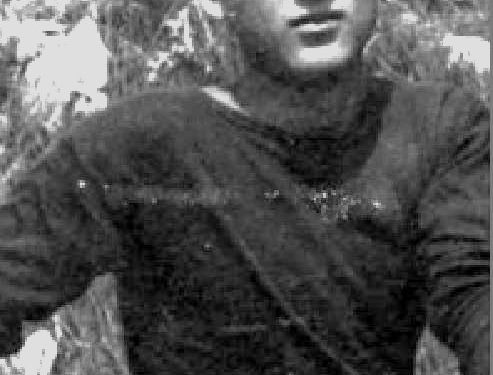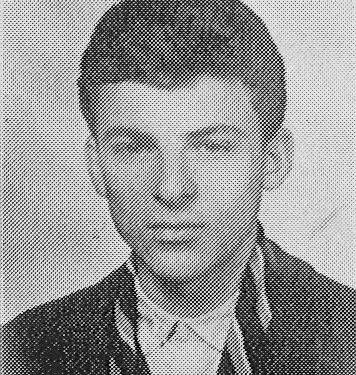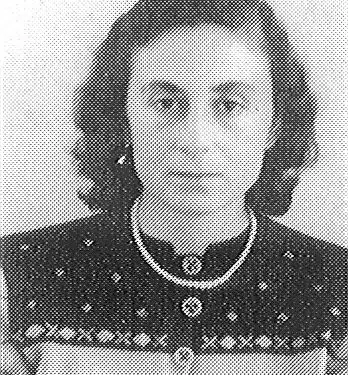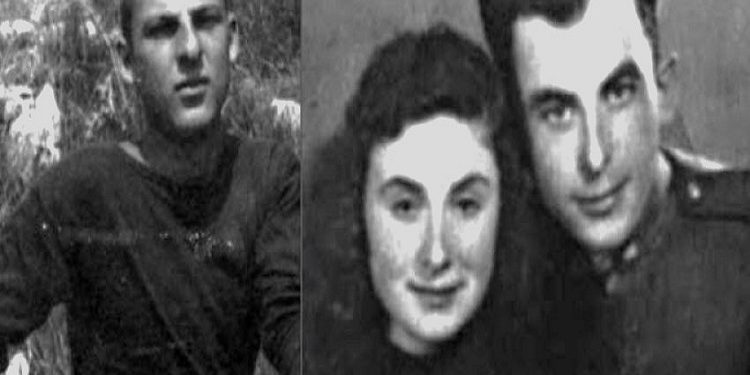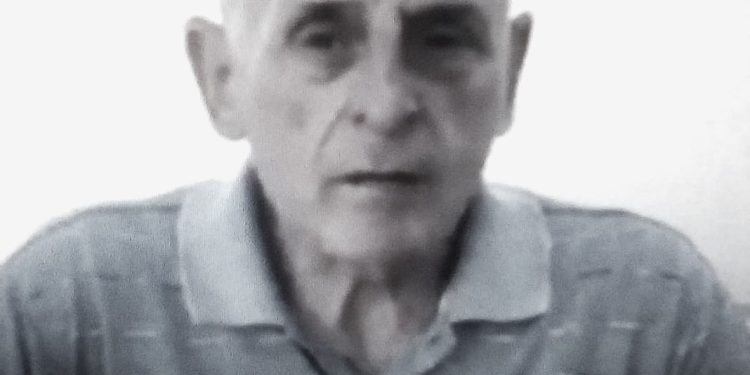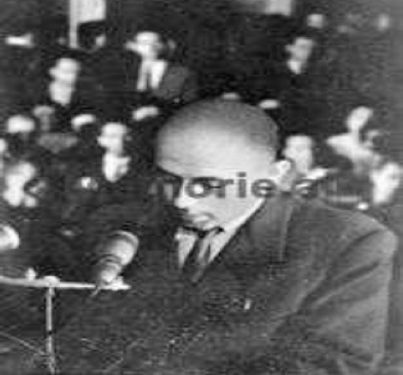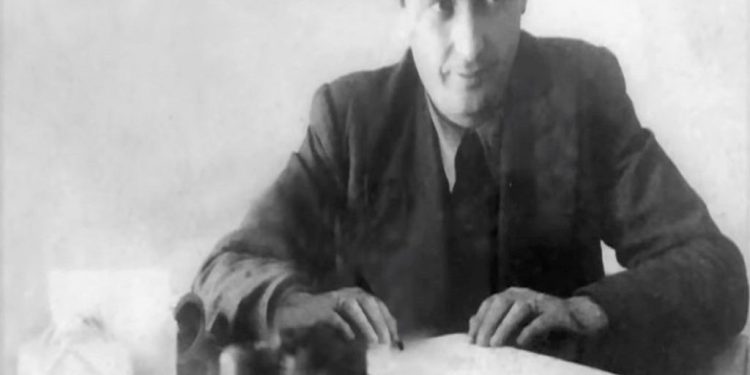By Idriz Zeqiraj
Memorie.al / By decision of the Commission for Deportation – Internment, under the Ministry of Interior, I was deported from Tirana and interned in the village of Bilçë in the district of Berat. Berat was a classic area for internment, because even a single policeman, stationed at a bridge, as the only crossing that connects Berat and Skrapar, with the rest of the country, controls every movement. During the time of the Kingdom, the communist Qemal Stafa was also interned there with other opponents of the Monarchy. But Communism had massiveized the exile, which started with 5 (five) years of punishment and lasted for decades, even, in most cases, the whole life, until eternity!
The moving space was limited to one kilometer. I worked in tree removal, to open new hilly lands. I lived in a room on the ground floor, in half darkness and full of humidity, with a broken door and window. The mice were understandably playing in my room. The room was very old, because it was an old building and looked more like a cattle shed.
I covered my head with a blanket, even in the heat of summer, for fear of being scratched or bitten by rats. My library books were their favorite “game” as they were placed on the floor in circular cardboard boxes.
A residential building was under construction. A room, without a kitchen, was planned for me; a room and a kitchen for the family of the former admiral of the Albanian Navy, Teme Sejko, and two rooms and a kitchen for the former first partisan of the Shkodra war, the former general, the former “Hero of the People” of Albania, the mountaineer from Vuthnjan – Sadik Bekteshi, family interned.
The course of events disrupted the original plan for the population of this building. I was the first to be arrested and sentenced to political prison. Then the former director of the Political Directorate of the Press in the Ministry of Defense, former lieutenant-general Sadik Bekteshi, was sentenced to 25 years in prison and, later, we would meet in the “Leather Shop”, as the locals called the Prison of Burrell.
Since from there the hopes of freedom were illusory utopias and a common pit-grave, “the neck of a cherry”, inside the prison enclosure, awaited, for eternal shelter, the shackled inhabitants of this wretched prison.
Violence against the Sejko family, violence against Chameria
Politics punished the Sejko family even more severely. Teme Sejko was from Filati i Chameria and his family was persecuted and driven out by the Greek government gangs in 1945. Teme, a smart, energetic young man excelled in military studies and patriotic loyalty, climbed the career ladder, became the first Rear Admiral of the Albanian Military Fleet.
In the 60s, with the montage trial, typically Stalinist, Kinse, in connection with espionage with the 6th American Fleet, was arrested in a group and executed by beating and torture. The family lived in Tirana. The wife was the sister of the only brother Korçar, a war martyr. She, with her two sons, Edmond and Sokol, was interned in Berat. Her elderly parents, although they had no other children, followed the girl to live together.
The little boy, Sokoli, was accused of trying to burn down the “Mao Ce Dun” Textile Factory in Berat! A 16-year-old girl just lit a cotton wick in a corner of the corridor at the entrance of the factory. And he did this, almost, on the order of Sokol! And, you know how “fast”, cotton burns!! A mock trial was organized. The participation of the Sejko family in the trial was conditional, only if the mother of the accused Sokol would deny the son in the courtroom!
But she was an educated and dignified mother. “I want to listen to the judicial process and if I am convinced of the boy’s guilt, I will deny it without hesitation”, she told the authorities of this fabricated judicial process. This condition was not accepted by the court! Sokol was sentenced to death – shooting, with the motivation “sabotage of the socialist economy”!
The 21-year-old Sokol Sejko, in the courtroom, denied, even in its entirety, the accusation made and denounced the State Security and the Party for the staged trial, with the aim of exterminating the Sejko family. And, he asked the family for a suit, to die beautiful. Two weeks after the sentence,
Sokol was executed on the slopes of olive grove in Berat. The person who had buried him, lost his freedom later, showed his brother, Edmond, the burial area, but not the grave-place, because the executed man had to be “seal-lost”, even forever!
The suicide of the Sejko brothers’ mother
The mother’s heart could not bear the execution of the innocent son. During a sleepless winter night, she wrote several letters and threw them under the doors of several interned families in the city of Berat, denouncing the trials and punishments for her husband Teme Sejko and son Sokol. And, as the new day dawned, dressed in a suit, jacket and trousers, she jumped, head down, from the balcony of the 5th floor of her apartment, ending her life.
That night, the eldest son, Edmondi, was a guest of his aunt in Plug i Lushnje, where the family of Cham Rexho Plaku, ex-commander of the “Chameria” partisan detachment, convicted and newly sentenced to political prison, was interned after more than two decades of suffering, he died in prison.
Edmond Sejko traveled, in the morning, with the first bus of the Lushnje-Berat line. He hurried downstairs to get his work clothes and the bag of bread. But the Security officer, who was waiting for him, grabbed his arm, saying: “Edmond, come with me, we have some work in the Home Branch (police)”!
At the entrance of the police station, another official addresses him: “Edmond Sejko, in the name of the people, you are under arrest”! The investigator’s first question to Edmond was: “Why did your mother commit suicide?” This was shocking to Edmond, who was learning of his mother’s death from the investigator.
And, he believed the news, because many citizens had seen him with great curiosity on the way down from the bus, because they had learned about the suicide of Teme Sejko’s wife, namely, the mother of brothers Edmond and Sokol Sejko. It was early morning and many people were rushing to work.
Inhumane treatment in the dungeon and acquaintance with Edmond Sejko
It was winter, it was very cold. They had stripped me of my coat, jacket, sweater, under my shirt and left me in only my pants and shirt, no socks, on the cement. The dungeon (cell) was underground, with excessive humidity and it was said that it is the only prison that has survived the centuries, has remained in operation “since the time of the Turks”.
The dungeon where hunger raged and seasoned, layered tobacco dust. It was perpetual darkness. A torn and dirty half-blanket, which the policeman gave me in the late hours of the night and took away before dawn, did not manage to cover my body, not even close. For seven months of the investigation, no shower, no cleaning and basic personal hygiene. Lonely and very hungry, but more grumpy.
After the sentence, in a dungeon, cell, I was joined with Edmond Sejko. We were waiting to be transferred to another prison, to serve the sentence. Edmondi was handsome and it was said that he is a copy of his father in his youth. When he learned about my background, he opened up and spoke freely about his family’s tragedy.
“I felt sorry for my grandparents, how will they cope with the loss of their daughter, my mother? They are old and sick. The mother was the only hope of their old age. Now I will suffer more for the living grandparents, than for the parents and the terrible dead brother”, Edmond Sejko painfully confessed.
The re-sentence of Edmond, in the prison of Spaç, while still serving the original sentence, to raise the quota of his sentence to 18 years in prison, brings to mind the words of his younger brother, Sokol, addressed to the communist court that; “Your goal is to destroy the Sejko family.” Meanwhile, their uncle, Taho Sejko, tired of the pressure and provocations of the State Security, committed suicide in Shkodër.
The violent granting of citizenship to the Chams, national treason
In 1945, it was rampant Greek nationalism that drove the Chams from their ancestral lands on the pretext that they had collaborated with fascism against Greece, which is not true.
In 1952, it was Enver Hoxha, who, with a special decree, violently gave them Albanian citizenship and did not allow them to return to their homes, in Chameri, Greece, even though the Greek Government, now in a new composition, was called for the collective return of all its citizens, forcibly displaced, at the end of the Second World War. Their properties were also registered and their tapis were preserved.
The violent granting of Albanian citizenship to the bloody and driven Chams, from their lands, under the barrels of guns and bayonets, giving legitimacy to the Greek government, for the removal of Greek citizenship, was and remains the national treason of Enver Hoxha and of the leadership of his criminal party.
And, this treason remains forever a national crime and the pinnacle of the serial betrayals of the Albanian communists, to the detriment of the Albanian cause. Surprisingly, the Albanian communists, wherever they were, stuck to the moldy and regressive Slavic-Stalinist ideology, like dung on shoes.
Chaste friendship with Dr. Beniamin Chettan
We traveled to the “Kaush” prison in Tirana with the escorted auto-prison. “Kaush” was the name of the large rooms, with wooden beds, attached to one, three floors, climbing stairs, on both sides of the room, with an alley in the middle. There was the collection of prisoners from all over Albania, to be distributed in the 11 prison-camps of the country and in the infernal prison of Burrel, the latter, destined, defined for the convicts of high political and military cadres , as well as the stoic, the steadfast, the unyielding, the incorrigible.
This category, as well as the former senior cadres, usually had to leave the bones inside the prison fence, in the “cherry butt”, in a pit-grave, where the multitude of bodies has made it impossible to identify the corpses time-tested initiative of democracy. The number of prisoners in the Burrel prison was limited, from 80 to 100 convicts, many young convicts, while serving their first sentence, with the sole purpose: to never enjoy freedom!
There we found the cardiologist, the specialist in heart diseases, well-known not only in the Durrës district, but also further in Albania, the mirditor, Dr. Beniamin Çetta, the brother of our esteemed professor, Anton Çetta. He was convicted with his large group of Cham patients, even all of them on the clichéd charge of “agitation and propaganda against the party and people’s power”, being “rewarded” with a tenner each. They were mostly old men. And, old age had increased their longing and broke their hearts for their homeland, the prosperous and divine Chameria.
Dr. Beniamin Çetta, even though he had passed all 45 years, was still not married. He lived with his mother and aunt, both elderly and with health problems. And, the doctor was more upset about the two lonely old women and impossible for personal services, than about his handcuffing. In the prison of Tirana, we became friends with Dr. Benjamin. He was loving, sincere, very polite, modest and very humane.
I asked him, why was he late for the wedding?! “Being single, I had more opportunities to take care of my mother and aunt and this burden, I don’t want this for my daughter-in-law,” the doctor told me, not without regret. This reminds us of the holy book “Bible”, where it is written that the Catholic religion does not prohibit the marriage of priests, but being eternally single, priests have more time to dedicate themselves to religion, the church, believers, God.
In 1990 Dr. Benjamin asked me to help him make a visit to Germany and meet his older brother, Anton. By now, I was an asylum seeker in Germany. I informed the Professor about the request of my brother, Beniamin, who thanked me and promised that “we will see each other soon” and adding that I would not do anything for Beniamin without meeting him.
Professor Çetta came to Germany met me, we talked and I informed him about dr.Ben, as we called him in prison. But, He ordered me to tell Dr. Benit that; “He has to wait some more time and I will arrange a visit to Kosovo, because the other family also wants to see him”. And so it was. Memorie.al




